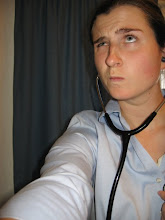Denali = my college (which is, of course, the best!)
Rainer
Columbia River
Snake River
Wind River
and Big Sky
Within the Colleges, students also get assigned to a "College Mentoring Group" with about 5 or 6 other students. Your College Mentor is an experienced physician who guides and supports you through you medical school and who plays a large role in your clinical learning in second year. Throughout second year we go to a hospital with our College mentor and the other students in our mentoring group and interview patients and practice our physical exam skills. Each student completes 2 completely histories and physicals a quarter, presents their patient to their group, and completes a write-up about the patient. (It is a lot of work, but we learn SOOOOO much through this experience).
 This is a picture (off the school's website) of Sam who is our Denali College Mentor. Sam is awesome. He is really good about giving very helpful feedback, but in a kind and supportive way. (I will try to post an update picture of our entire college mentoring group next quarter. I kept forgetting to take pictures this quarter).
This is a picture (off the school's website) of Sam who is our Denali College Mentor. Sam is awesome. He is really good about giving very helpful feedback, but in a kind and supportive way. (I will try to post an update picture of our entire college mentoring group next quarter. I kept forgetting to take pictures this quarter).Anyway, towards the beginning of the quarter I interviewed a very nice patient who had been admitted to the hospital because of chest pain. I didn't get through everything, but I finished as much of history and physical as time would allow. Then I presented the case to my mentor and mentoring group classmates. I was really nervous and my mouth was dry and my hands were shaking while I was presenting the case. Then we got to the end and our mentor asked me: "So what are some of the most likely causes of the chest pain?" I froze and I couldn't think of anything to say other than a possible myocardial infarction (a heart attack). My mentor smiled and asked with an inquisitive look if I could possibly think of anything else that could cause chest pain. I swallowed slowly and quickly tried search my brain, only to find that it was completely void of any useful knowledge. In fact, the only thing present seemed to be the word, "uh?" echoing through my skulls empty chambers. I looked at the floor and said that I couldn't think of any other possible causes of chest pain. I was embarrassed then, but it was nothing to how I felt once I got home and looked up "Chest Pain" in my physical exam book. The possible causes of chest pain and almost countless. Just a few that I found were:
-myocardial infarction
-cardiac arrhythmia
-aortic dissection
-pericarditis
-pulmonary embolism
-pneumonia
-lung cancer
-pneumothorax
-pleural effusion
-hyperventilation
-anxiety
-depression
-reflux esophagitis
-esophageal spasm
-peptic ulcer
-gastritis
-pancreatitis
-biliary colic
-cervical arthritis
-costochondritis
-herpes zoster
I can't believe that I couldn't think of just one more from the list. I guess we are still a long way from becoming doctors. Hopefully, we improve a lot this year!









